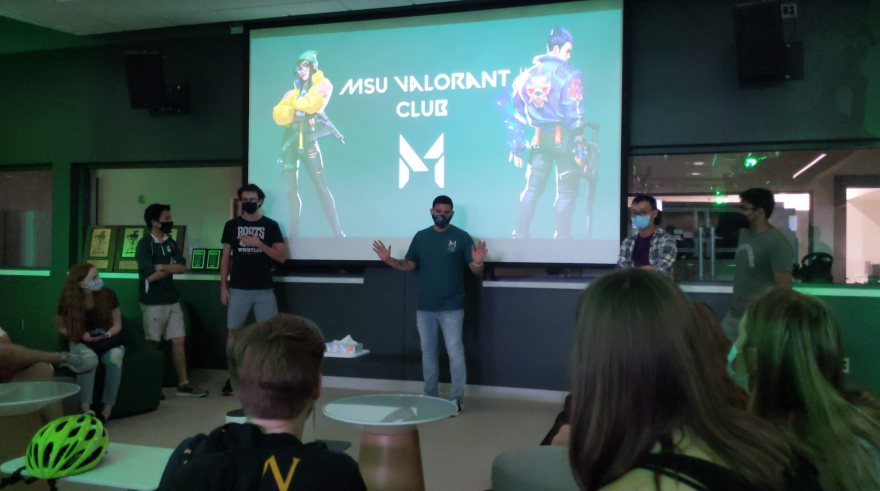What started as an interest in the Wii turned into a passion for the competitive community of esports for Michigan State junior Dylan McCarroll. He is a Computer Science major, with a minor in Game Design and Development, and the president-elect of MSU’s Esports Club Association.
McCarroll started playing several games as a teen that carried into his college career, despite facing disapproval from his high school in Warren, Michigan.
“Gaming clubs at my high school were actively dissuaded and frowned upon. It was very depressing to know that the staff at my high school thought what I was doing was a waste of time, when really I have never felt more passionate about a hobby and a community than I do about esports,” said McCarroll.
There is a strong emphasis at Michigan State on growing the esports community in many facets-as a club sport, in research and as an academic opportunity. The esports club, for one, is a great way to meet friends and compete all in one.

“For me, it was such a simple thing: food with friends. Many esport clubs at MSU like to celebrate after their club meeting with food, and that after-club outing holds a special place in my heart,” said McCarroll.
Esports’ sense of community is the same as other MSU club sports and a major reason why people join.
“I would say that under the influence of friends and others, and under the influence of wanting to watch sports and maybe a lot of combination of those two could lead people to esports more,” said Yiming “Skylar” Lei, a doctoral student in MSU’s Department of Media and Information.
MSU club esports teams are successful with players in the highest ranks of games such as Super Smash Bros. Ultimate and Rocket League. The Michigan State Counter-Strike Club team has won $20,000 in prize money within the last year. Since the MSU Esports Club Association’s start, the club has expanded from two graduate students in 2016 to over 2,000 members this year.
Michigan State’s Communication Arts and Sciences Building will be hosting a tournament, The LAN Before Time, with several different games in order to raise money for charity. The tournament is on March 19 from 11 a.m. to 11 p.m.
Not only does MSU build up the club aspect of esports, but it also has several research studies that relate to the effects of video games and esports on communities. Dr. David Ewoldsen, Lei’s advisor at MSU, and his colleague researched cooperative gameplay and how it can actually increase prosocial behavior instead of aggression, even in violent games.
“[Gaming] makes you see others as part of your ingroup member, which is a social psychology term as opposed to an outgroup member. So even if you play violent games that may increase your aggression, the ingroup member status eases that, attenuates that aggression and turns that into prosocial intentions,” said Lei.
This study is basically saying that those in gaming see other players as “members” of their group and this creates a community rather than an aggressive competition, even when playing violent video games.
“I feel like a lot of times it is down to the game. If we develop, we design games in a way that makes people emphasize and work with others instead of against others, we might have a very different gaming experience,” said Lei.
The third aspect of esports that MSU puts a lot of effort into is the academic opportunities for a career in esports.

“Michigan State University currently boasts the highest-ranked, for a public university, game development program in the country,” said Ryan Thompson, interim Esports Director for MSU.
In recent years, Michigan State created an undergraduate game development major within the College of Communication Arts & Sciences. MSU also has plans to add another competitive gaming-grade computer lab. This lab would allow for active game development, competitive gameplay, and live broadcasting.
Faculty at MSU, including Thompson, have also worked to teach students hands-on when it comes to video games, and the problems that may arise in esports, such as navigating contracts and using trademarked logos for merchandise.
Thompson teaches practical skills in esports, like broadcast live gameplay, live music and live presentations on several platforms such as Twitch and YouTube Live.
“I teach elective coursework on live streaming, which is closely tied to the emerging esports movement. Students who take MI 334 learn about what is happening as people begin to transform private play into public entertainment and how that transformation is drastically shifting our understanding of modern media,” said Thompson.
With all of this development, the future of esports is still unknown but with enormous potential.
“The real difference to regular sports is the accessibility of the space. It doesn’t matter your gender, age, height or physique, if you can play the game, want to improve and are passionate about it all, you are welcome,” said McCarroll.

